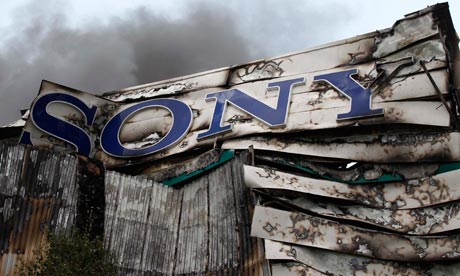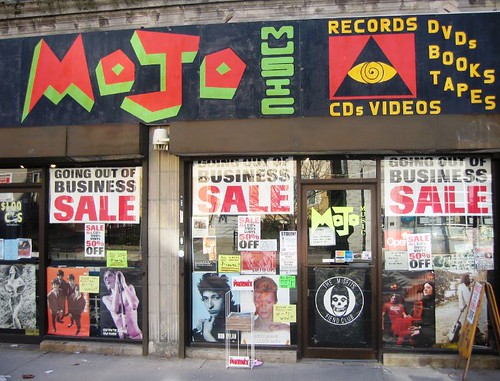Piracy is Looting — And That’s OK
If you support piracy, you should support looting. I say this as a supporter of piracy, one trying to come to a consistent position on property as a whole. Plenty of people defend piracy, plenty more pirate secretly, and usually they will have an excuse, like “Pirates buy more music” or “I’m going to the show, so I’m supporting the artist” or “I don’t have money, so the company wouldn’t have gotten me to pay anyway.” They draw boundaries between the good or neutral piracy that they practice, and the bad piracy and theft that others practice. Instead of creating a preserve where the things that I and my friends do is ok, I’m more interested in expanding categories so we can see how what we do is aligned with what others do too.
So what is piracy? It is the deliberate violation of the current system property rights. Our system states that corporations can buy, sell, and own the exclusive right to copy music recordings, films, and books. Anyone else who does so is a criminal. Even though many people possess the means to easily copy and distribute intellectual property, they aren’t allowed. So what happens? We do it anyway. We torrent, we join password-protected communities, we Google music blogs, we upload to YouTube under disguised names, we rip and burn, we violate the laws of property willingly, continuously. We do this because we can. Because it’s easy. Because we know the media companies are greedy exploitative bastards. And because many of us don’t have the disposable income to blow indiscriminately on records, movie tickets, DVDs, and books.
And pay is indeed an important, if neglected, component of piracy. As the SSRC report “Media Piracy in Emerging Economies” states,
Media piracy has been called “a global scourge,” “an international plague,” and “nirvana for criminals,”1 but it is probably better described as a global pricing problem. High prices for media goods, low incomes, and cheap digital technologies are the main ingredients of global media piracy. If piracy is ubiquitous in most parts of the world, it is because these conditions are ubiquitous. Relative to local incomes in Brazil, Russia, or South Africa, the price of a CD, DVD, or copy of Microsoft Office is five to ten times higher than in the United States or Europe. Licit media goods are luxury items in most parts of the world, and licit media markets are correspondingly tiny.
It’s piracy or nothing. Or to appropriate someone else’s words, Share or Die.
So what about looting? Looting is the widespread theft of goods on a mass scale. Looters violate property laws, but many people, including pro-piracy people, will tell you it’s different, that taking a pair of sneakers isn’t the same as downloading an MP3. That seems true on the face of it, but it relies on some faulty claims.
First of all, shoes cannot be shared the way I share an MP3 — it benefits only the person who possesses it at the time. In economic jargon, shoes are “rivalrous.” Now, while it may be true in a limited metaphysical sense that shoes are rivalrous, in the context of the actual world (from which all analysis should proceed), we know that vast quantities of shoes are produced. In fact, if you had $100 to spend, you could go to the store right now and pick out one pair of shoes among many. Very few, if any, readers reading this right now face an actual scarcity of shoes available for purchase. However, we might not be able to afford shoes at any given time. I myself have had to put off replacing worn-out shoes until I could amass enough money to get new ones. I knew that once I had the money, I would have no trouble buying the shoes. Even if other people bought shoes, it wouldn’t prevent me from getting the exact same, or a nearly identical, type of shoe. So this kind of overproduction of mass-produced goods, combined with the widespread inability for many people to pay for these goods, renders the point about rivalrous goods moot.
Now to get that shoe for free, to steal it, would require committing a crime that seems very different from downloading an MP3. In the eyes of the law, in both cases you have violated someone else’s private property rights. But stealing a pair of shoes requires a different kind of physical activity to pull off. Illegally downloading an MP3 just means I sit behind a computer and type, the same way I check my email or do my taxes. I could do it in a cafe without disturbing a single person’s enjoyment of their latte. But looting will probably entail damaging some property — broken locks, smashed windows, and the like. Some people will find this a tad impolite. They think someone who entertains thoughts of violating property laws — laws governing physical property, they have no problem burning a CD for a friend — morally flawed. It creates a mess. In fact, Rudy Giuliani gentrified New York City using the belief that messes were worse than other types of crimes. People who think this way would prefer that you and I walk around unshod rather than make a mess. In fact, as long as you don’t make a mess, they don’t really care about whether you have shoes, food, healthcare, or anything else you need to survive. That, in my book, is some fucked up priorities, revealing, for all their peaceful coffee-sipping, a profound flaw in moral thinking.
So looting says the same thing that piracy says: we can take it and, by coordinating masses of others, we will. If we could torrent clothes and food using Starbucks WiFi, we would, but until then, we can loot from the vast stores of stuff that’s already been produced. Either way, we damage the industries we take from. And that is good, because these industries are terrible, greedy, inhuman industries that exploit their workers and cheat their customers. You could ask Steve Albini, or you could ask any of these women in a Nike sweatshop.

In the London riots, a warehouse owned by Sony housing materials to be distributed by Pias was burned down. Thousands of DVDs and CDs were lost. My first thought was, “Oh no, independent artists will be hurt!” My second thought was “Who was going to buy all that shit?” In fact, the fire could be a boon to some of the affected parties, since they’ll get insurance payout on stock that a decent internet connection renders worthless, unsaleable. Just a bunch of flat shiny discs that fewer and fewer people want, that fewer and fewer people can pay for. Isn’t this the world of pirates, the world where art doesn’t need factories and warehouses and sweatshops, where everyone can pay according to their ability, where the giant corporations who suck income from us at every turn end up looking like this? This is what our piracy, our looting can do.


Holding up the “indie labels” was a way to try and make us feel bad, to think that looters were hurting nice little companies run by nice indie people. It functions the same as this picture:

A nice old man, rummages through the wreckage of his shop. “I’ll probably have to close because I haven’t got insurance,” and we are supposed to imagine the terrible looters who took “a number of small items, including his kettle and cotton wool” from this poor old man. How could they do this? And we forget that the reason people rioted was not that they hated this old man, but because the police murdered yet another one of them, and then roughed up a teenager at a peaceful demonstration against the killing.
While we don’t know what this man’s relationship was to the people who stole his kettle, we should be aware that looting, like piracy, can harm people who we don’t think deserve it. We can pirate independent art and loot independent businesses as easily as the big name stuff, even more easily. Some music fans adopt an ethical stance, saying they support artists they like in various ways — promising to buy the CD, paying for a ticket, purchasing a T-shirt. There’s no reason looters can’t have the same ethics, against hurting people and against destroying the property of those who contribute to the community. I suspect many already do.
An NPR story about looting (related to Katrina hysteria, where we discovered that white people never loot), argues there can be ethics of looting. “Who could let their child or grandmother go hungry in a catastrophic emergency not of one’s own making simply to preserve the ethical rule against stealing?” Anita Allen asks. These silly conditionals are a middle class affectation, designed to obscure the fact that it doesn’t take a catastrophic emergency for needs to go unmet. Take that part out. Who could let their child or grandmother go hungry simply to preserve the ethical rule against stealing?

The people that say information wants to be free don’t say that shoes want to be free. Or that iPhones want to be free. Or that food wants to be free. Information doesn’t want to be free. Information doesn’t want anything. To say so is to disavow the truth: we want information to be free, because we know that is the way it should be. That art, knowledge, and formulas to life-saving medicines shouldn’t be commodities, but should be available on different terms, not exclusively on something as capricious as our ability pay. This is not some special preserve of art. This is true of clothing, of food, and of gadgets. It is true of survival, and of pleasure too.
Pirate Capitalists will tell you there are new business models out there, that piracy can reinvigorate a moribund media production and distribution system. I think they are wrong, that they are mostly hucksters, and that very few people will end up profiting much from a pirate media economy. But very few people benefit from capitalism at all, though for a while we fooled ourselves into thinking that plenty of people would do just fine under it. Our task is not to find new business models for the current system. What we need to do is realize that the art and social relations we want cannot be supported by the current system, and that the current system needs radical change. This change will come from the gravediggers that the current system of private property produces, the people who don’t benefit from it and have the power to destroy it. Pirates. Looters. Us.